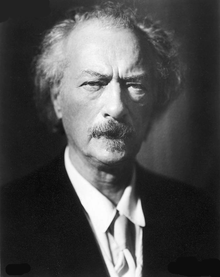Ignace Paderewski
| Ignancy Jan Paderewski | |
|---|---|

Paderewski circa 1935
|
|
| 2nd Prime Minister of the Republic of Poland | |
|
In office 18 January 1919 – 27 November 1919 |
|
| Preceded by | Jędrzej Moraczewski |
| Succeeded by | Leopold Skulski |
| Minister of Foreign Affairs | |
|
In office 16 January 1919 – 9 December 1919 |
|
| Preceded by | Leon Wasilewski |
| Succeeded by | Władysław Wróblewski |
| Chief of the National Council of Poland | |
|
In office 9 December 1939 – 29 June 1941 |
|
| Personal details | |
| Born |
6 November 1860 Kuryłówka, Podolia |
| Died | 29 June 1941 (aged 80) New York City, U.S. |
| Profession | pianist, composer, politician |
| Signature | |
Ignacy Jan Paderewski, GBE (Polish: [iɡˈnat͡sɨ ˈjan padɛˈrɛfskʲi]; 18 November [O.S. 6 November] 1860 – 29 June 1941) was a Polish pianist and composer, politician and spokesman for Polish independence. He was a favorite of concert audiences around the world. His musical fame opened access to diplomacy and the media.
Paderewski played an important role in meeting with President Woodrow Wilson and obtaining the explicit inclusion of independent Poland as point 13 in Wilson's peace terms in 1918, called the Fourteen Points. He was the prime minister of Poland and also Poland's foreign minister in 1919, and represented Poland at the Paris Peace Conference in 1919. He served 10 months as prime minister, and soon thereafter left Poland, never to return.
Paderewski was born to Polish parents in the village of Kuryłówka (Kurilivka), Litin uyezd in the Podolia Governorate of the Russian Empire. The village today is part of the Khmilnyk raion of Vinnytsia Oblast in Ukraine. His father, Jan Paderewski, was an administrator of large estates. His mother, Poliksena, née Nowicka, died several months after Paderewski was born, and he was brought up by distant relatives.
From his early childhood, Paderewski was interested in music while living at the private estate near Żytomir, where he moved with his father. However, soon after his father's arrest in connection with the January Uprising (1863), he was adopted by his aunt. After being released, Paderewski's father married again and moved to the town of Sudylkov, near Shepetovka.
...
Wikipedia
